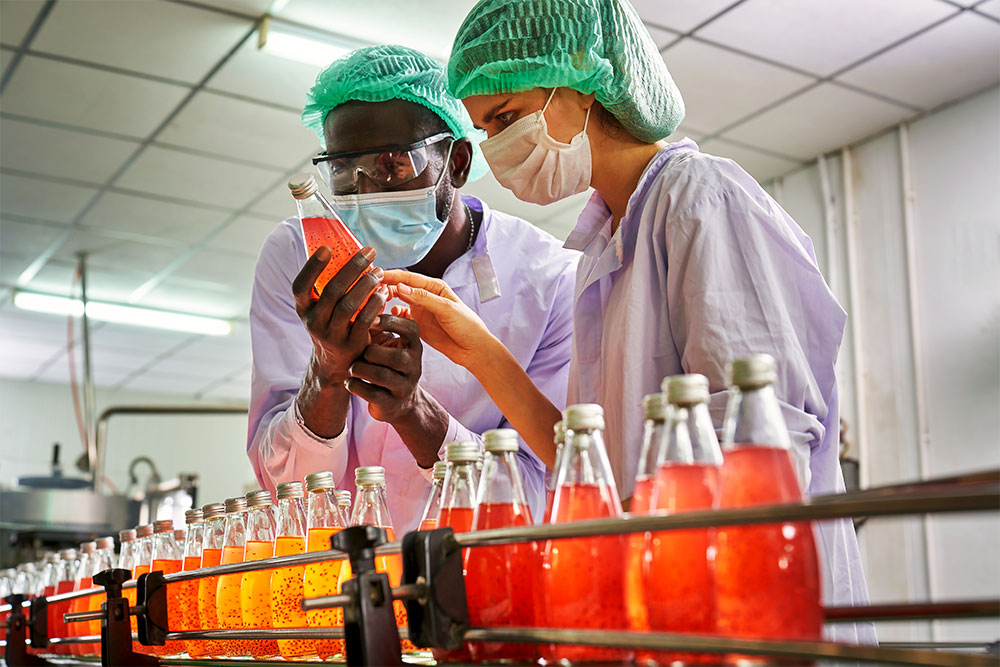
Food is big business. Huge! Just open up the TikTok app and search #foodtok. There are literally billions of videos dedicated to all things food. It’s wild and wonderful, from butter candles to the ultimate smash burgers. Unsurprisingly, UK restaurants have an annual turnover of over £40 billion.
It’s essential that when producing food for consumers to eat and hopefully love, it’s done so safely.
This makes complying with the Food Safety Act 1990 crucial. By doing so, food businesses run a lower risk of making consumers unwell. Let’s look deeper at food safety, why the Act is important, and your primary responsibilities as a food business.
Food Safety in Brief
Food safety can be defined as the safe handling, storage, preparation and delivery of food to prevent infection and harm.
According to the Food Standards Agency (FSA), over two million food poisoning cases are reported annually in the UK. That’s a lot of unhappy customers.
Ensuring the food is safe for consumption starts with how it’s produced and delivered. Safe agricultural practices must lead to safe packaging and delivery of food items. Food businesses that receive these items need to have procedures to keep food safe until it reaches the end consumer.
Foods containing harmful bacteria, parasites, viruses or chemical substances can cause over 200 diseases. These diseases range from diarrhoea to cancers.
Data released by the World Health Organisation (WHO) shows that at least 600 million people worldwide are harmed by foodborne illnesses. And around 420,000 of those inflicted die each year.
On the other hand, a safe food supply supports national economies, trade and tourism. It also reduces food waste, which has environmental consequences.
What is the Food Safety Act 1990
The Food Safety Act is the go-to compliance document for food businesses. It’s the framework for all UK food legislation. It affects all UK food businesses, outlining the standards they must meet to protect consumers.
At the heart of this vital legislation is the safety of those who consume food items handled, prepared, stored and served by food businesses. Every food business must keep food safety and the health of its customers central to everything they do. Food is to be enjoyed and provide nourishment, not cause harm.
Food Business’ Responsibilities
The primary responsibilities of food businesses under the Food Safety Act 1990 are to make sure:
- Nothing is added to or removed from food that could harm consumers’ health.
- Food is not treated in a way that would damage the health of anyone who eats it.
- All food served or sold to consumers is of the nature, quality and substance they would expect.
- Food is never labelled, advertised or presented in a false or misleading way.
This must be woven into operations and a food safety policy.
Your Food Safety Policy
Food businesses, and those that serve food, must have a food safety policy in place. Your food safety policy breaks down how you prepare, handle, and store food so the end consumer is not harmed.
The end consumer doesn’t need to be a paying customer, either. You must have a food safety policy if your employees benefit from an on-site canteen. And if this service is outsourced, say to an external catering company, they must provide you with their policy.

The Food Safety Act 1990 and the Food Hygiene Regulations 2006 will be your references when you write your policy. The aim of your policy is to comply with the Act. The depth of the policy will depend on how little or much you deal with food. Your policy should cover the following:
- Duties and responsibilities
- Hygiene Management
- Food handling/delivery/storage
- Preparation/Cooking
- Distribution and service
- Waste and refuse
- Cleaning and maintenance
- Pest Control
You should also include what you would do in the unfortunate event of someone becoming ill after consuming food they got from you and what you do if food needs to be recalled.
Lastly, your food safety policy will inform the training you provide to food handlers. Training is central to maintaining safe food practices.
Why is the Food Safety Act Important?
If a consumer becomes ill, the Food Safety Act will be referred to in prosecuting the food business that harmed them.
Who Should Receive Food Safety Awareness Training?
Everyone in your internal food supply chain should be trained. That could include anyone from staff who physically prepare and cook food to those who deliver or dish it out. There will be different training requirements based on how much involvement someone has with food products.
General awareness is always a good start and can be built on with supplemental courses.
Learn How You Can Help to Keep Food Safe
Training is a surefire way to reduce the likelihood of someone being inflicted with a foodborne illness. Food is to be enjoyed. Unsafe food prevents this. Food purchased from you can harm your reputation and profit margin if someone is made ill.
Our Level 2 Food Hygiene Course gives you the know-how to protect customers and those you cater for. You’ll learn about basic cooking, storage, hygiene and handling practices. All these will help you minimise the risk of unsafe food reaching your customers.



















































































































































































































































































































































































































































































































































































































































































































































